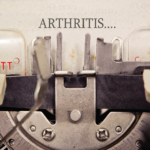
Laura Jonas McGaffick
As part of the Rheumatology Research Foundation’s Visibility Initiative, the Rheum Life campaign was developed as a way to share a patient’s perspective of what life is like with a rheumatic disease. Rheum Life also provides insight into current Foundation-funded research and the impact it will have on the lives of these patients. Exposure to patient perspectives and innovation in the field benefit the community of patients, as well as rheumatology health professionals who work diligently to improve the lives of those with rheumatic disease.
Using the #RheumLife hashtag on social media and linking to features on the website, the Foundation has shared nearly 30 patient stories of life with rheumatic disease. Patients featured on the website are paired with investigator profiles, whose Foundation-funded research and training programs will hopefully lead to improved outcomes. Given that the more than 100 known rheumatic diseases are incurable, presenting relevant research to patients can raise awareness of the importance of continued funding for these programs.
Some patients, like Andrea Christenson, diagnosed with psoriatic arthritis and adult-onset Still’s disease, face a life of disability. “Before I was diagnosed, a rheumatologist told me that I might need assistance walking or need to be in a wheelchair for the rest of my life. It was then that I looked into getting a service dog, and I eventually decided to train my own. My dogs are what force me to keep moving, even on the bad days.”

Andrea Christenson with her three service dogs, who help her navigate the world with psoriatic arthritis and adult-onset Still’s disease.
Others, like Laura Jonas McGaffick, are forced to sacrifice their goals and hobbies. “Because of my rheumatic disease, I have had to give up so many things, like a teaching career, hiking and skiing.”
For those like Andrea living with psoriatic arthritis, Alexis Ogdie, MD, MSCE, of the University of Pennsylvania, is using the Foundation’s Innovative Research Award to focus on optimizing psoriatic arthritis (PsA) clinical trials. Dr. Ogdie’s work considers aspects of the disease that are unique to PsA and builds a relationship with patients for a more individualized approach to PsA treatment.
Joseph Holoshitz, MD, and his lab at the University of Michigan have made significant advances in the understanding of the shared epitope that genetically predisposes individuals to rheumatoid arthritis (RA). His work with the Foundation’s Innovative Research Award is studying new chemical compounds that potentially inhibit the shared epitope’s effect on RA. Dr. Holoshitz’s research could inform new treatments and preventive measures for RA and help patients like Laura get their lives back.


